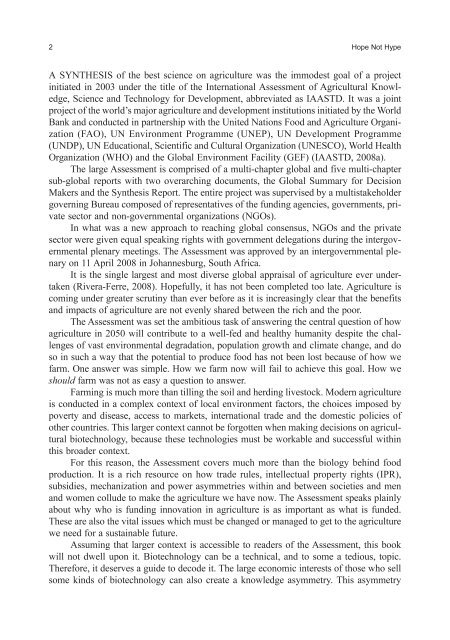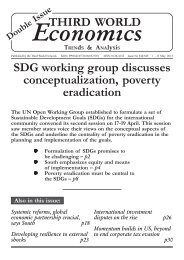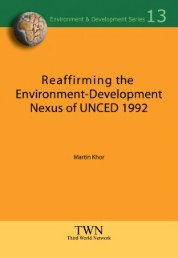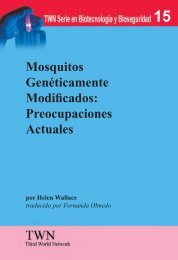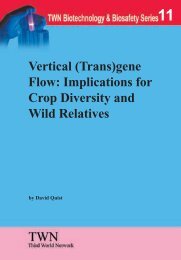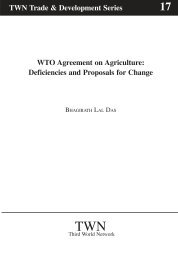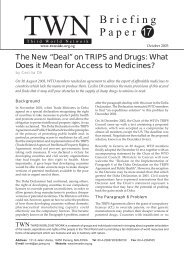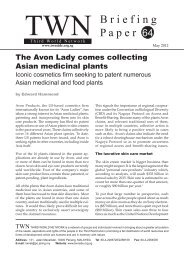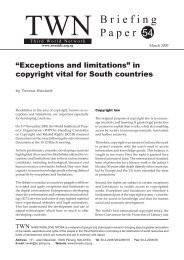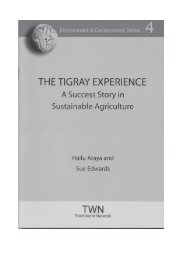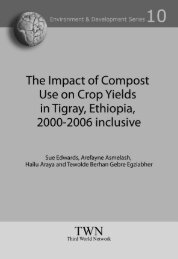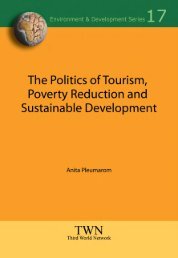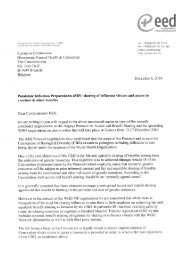Hope Not Hype - Third World Network
Hope Not Hype - Third World Network
Hope Not Hype - Third World Network
- No tags were found...
You also want an ePaper? Increase the reach of your titles
YUMPU automatically turns print PDFs into web optimized ePapers that Google loves.
2 <strong>Hope</strong> <strong>Not</strong> <strong>Hype</strong><br />
A SYNTHESIS of the best science on agriculture was the immodest goal of a project<br />
initiated in 2003 under the title of the International Assessment of Agricultural Knowledge,<br />
Science and Technology for Development, abbreviated as IAASTD. It was a joint<br />
project of the world’s major agriculture and development institutions initiated by the <strong>World</strong><br />
Bank and conducted in partnership with the United Nations Food and Agriculture Organization<br />
(FAO), UN Environment Programme (UNEP), UN Development Programme<br />
(UNDP), UN Educational, Scientific and Cultural Organization (UNESCO), <strong>World</strong> Health<br />
Organization (WHO) and the Global Environment Facility (GEF) (IAASTD, 2008a).<br />
The large Assessment is comprised of a multi-chapter global and five multi-chapter<br />
sub-global reports with two overarching documents, the Global Summary for Decision<br />
Makers and the Synthesis Report. The entire project was supervised by a multistakeholder<br />
governing Bureau composed of representatives of the funding agencies, governments, private<br />
sector and non-governmental organizations (NGOs).<br />
In what was a new approach to reaching global consensus, NGOs and the private<br />
sector were given equal speaking rights with government delegations during the intergovernmental<br />
plenary meetings. The Assessment was approved by an intergovernmental plenary<br />
on 11 April 2008 in Johannesburg, South Africa.<br />
It is the single largest and most diverse global appraisal of agriculture ever undertaken<br />
(Rivera-Ferre, 2008). <strong>Hope</strong>fully, it has not been completed too late. Agriculture is<br />
coming under greater scrutiny than ever before as it is increasingly clear that the benefits<br />
and impacts of agriculture are not evenly shared between the rich and the poor.<br />
The Assessment was set the ambitious task of answering the central question of how<br />
agriculture in 2050 will contribute to a well-fed and healthy humanity despite the challenges<br />
of vast environmental degradation, population growth and climate change, and do<br />
so in such a way that the potential to produce food has not been lost because of how we<br />
farm. One answer was simple. How we farm now will fail to achieve this goal. How we<br />
should farm was not as easy a question to answer.<br />
Farming is much more than tilling the soil and herding livestock. Modern agriculture<br />
is conducted in a complex context of local environment factors, the choices imposed by<br />
poverty and disease, access to markets, international trade and the domestic policies of<br />
other countries. This larger context cannot be forgotten when making decisions on agricultural<br />
biotechnology, because these technologies must be workable and successful within<br />
this broader context.<br />
For this reason, the Assessment covers much more than the biology behind food<br />
production. It is a rich resource on how trade rules, intellectual property rights (IPR),<br />
subsidies, mechanization and power asymmetries within and between societies and men<br />
and women collude to make the agriculture we have now. The Assessment speaks plainly<br />
about why who is funding innovation in agriculture is as important as what is funded.<br />
These are also the vital issues which must be changed or managed to get to the agriculture<br />
we need for a sustainable future.<br />
Assuming that larger context is accessible to readers of the Assessment, this book<br />
will not dwell upon it. Biotechnology can be a technical, and to some a tedious, topic.<br />
Therefore, it deserves a guide to decode it. The large economic interests of those who sell<br />
some kinds of biotechnology can also create a knowledge asymmetry. This asymmetry


